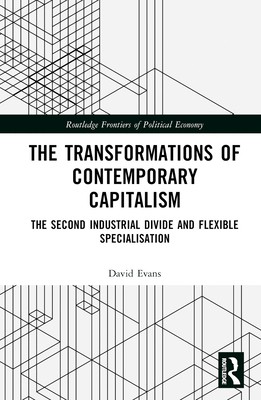
- We will send in 10–14 business days.
- Author: David Evans
- Publisher: Routledge
- ISBN-10: 1032395877
- ISBN-13: 9781032395876
- Format: 15.6 x 23.4 x 1.9 cm, kieti viršeliai
- Language: English
- SAVE -10% with code: EXTRA
Reviews
Description
In recent decades there has been many attempts to describe, explore and explain the new 'post-modern' capitalism of the 21st century. In this context, this book looks at one of the most exciting strands of this research in the late twentieth century: the flexible specialisation research programme.
Drawing on the history of ideas, discourse, and literature on capitalism of the last four decades, the book shows that although 'flexible specialization' anticipated some of the ways in which capitalism was being transformed in the late twentieth century, they underestimated and failed to anticipate the forms of 'creative destruction' and corporate digital control which were becoming embedded in the global capitalist accumulation dynamic itself. The sudden disappearance of the Soviet Union and the 'end of history' failed to open-up the pathway for new forms of modern social democracy but gave rise instead to the new digital Behemoths. Today, the classical tendencies of capitalism as anticipated by Marx are all too present and, despite talk of post-capitalism' and 'digital/techno-feudalism', the landscape of monopoly-finance capital has consolidated itself. The book counterposes the flexible specialisation research programme (FSRP) with the various Marxist interpretation of the capitalist transition, together with the wider social and economic theories that emerged in the first decades for the twenty-first century around, for example, the 'great acceleration', de-growth, and post-growth.
This book will be of interest to all readers concerned with both heterodox political economy, critical social theory, intellectual history and, above all, the prospects for social transformation leading to social justice and an 'egalitarian enlightenment'.
EXTRA 10 % discount with code: EXTRA
The promotion ends in 23d.11:29:07
The discount code is valid when purchasing from 10 €. Discounts do not stack.
- Author: David Evans
- Publisher: Routledge
- ISBN-10: 1032395877
- ISBN-13: 9781032395876
- Format: 15.6 x 23.4 x 1.9 cm, kieti viršeliai
- Language: English English
In recent decades there has been many attempts to describe, explore and explain the new 'post-modern' capitalism of the 21st century. In this context, this book looks at one of the most exciting strands of this research in the late twentieth century: the flexible specialisation research programme.
Drawing on the history of ideas, discourse, and literature on capitalism of the last four decades, the book shows that although 'flexible specialization' anticipated some of the ways in which capitalism was being transformed in the late twentieth century, they underestimated and failed to anticipate the forms of 'creative destruction' and corporate digital control which were becoming embedded in the global capitalist accumulation dynamic itself. The sudden disappearance of the Soviet Union and the 'end of history' failed to open-up the pathway for new forms of modern social democracy but gave rise instead to the new digital Behemoths. Today, the classical tendencies of capitalism as anticipated by Marx are all too present and, despite talk of post-capitalism' and 'digital/techno-feudalism', the landscape of monopoly-finance capital has consolidated itself. The book counterposes the flexible specialisation research programme (FSRP) with the various Marxist interpretation of the capitalist transition, together with the wider social and economic theories that emerged in the first decades for the twenty-first century around, for example, the 'great acceleration', de-growth, and post-growth.
This book will be of interest to all readers concerned with both heterodox political economy, critical social theory, intellectual history and, above all, the prospects for social transformation leading to social justice and an 'egalitarian enlightenment'.


Reviews